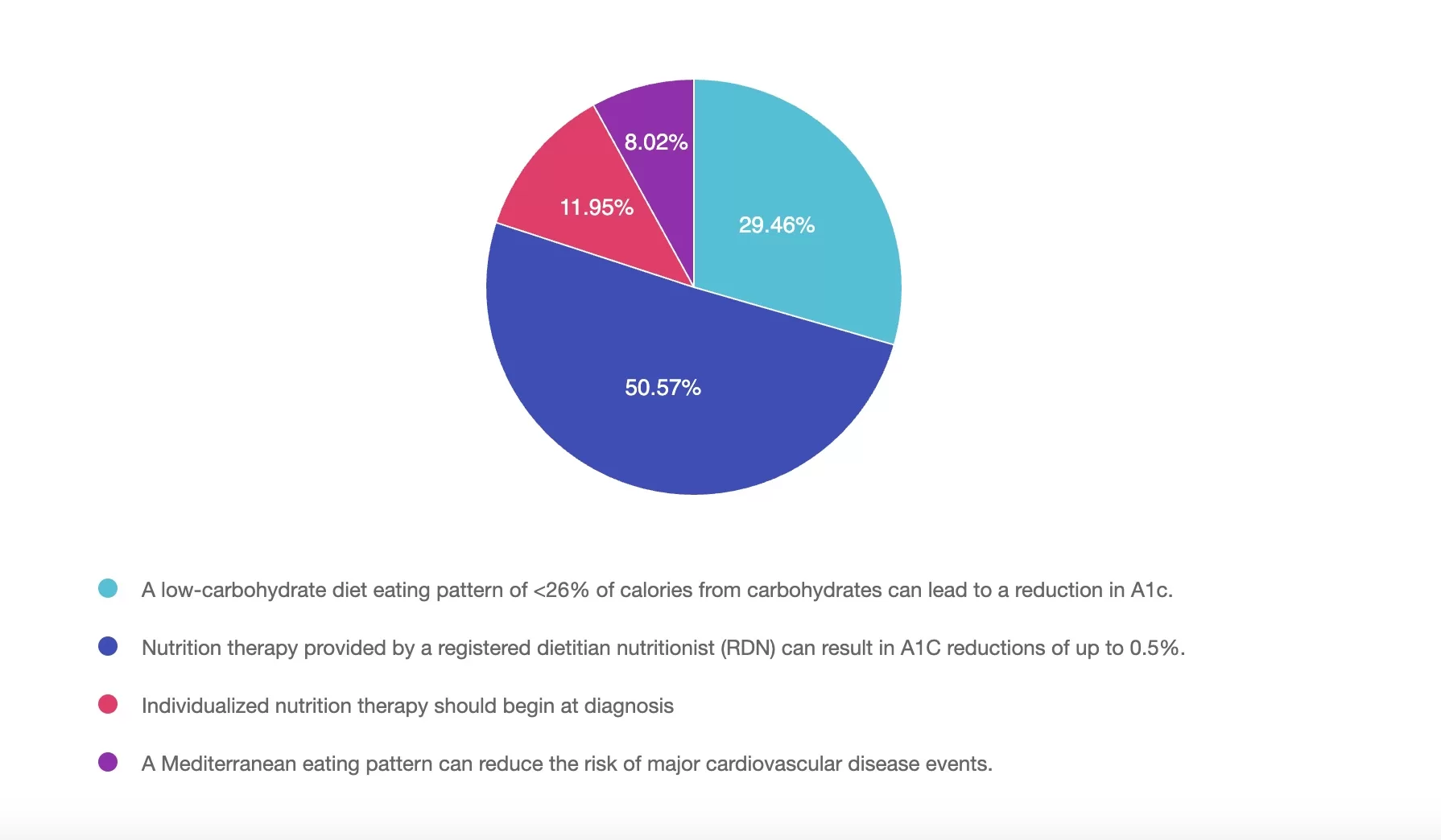For last week’s practice question, we quizzed participants on ADA 2025: Which MNT Statement Is False? 50% of respondents chose the best answer. We want to clarify and share this important information, so you can pass it on to people living with diabetes and your colleagues, plus prepare for exam success!
Before we start though, if you don’t want any spoilers and haven’t tried the question yet, you can answer it below: Answer Question

Question: According to the 2025 ADA Standards of Care, which of the following statements about medical nutrition therapy (MNT) for adults with type 2 diabetes is NOT TRUE?
Answer Choices:
- A low-carbohydrate diet eating pattern of <26% of calories from carbohydrates can lead to a reduction in A1c.
- Nutrition therapy provided by a registered dietitian nutritionist (RDN) can result in A1C reductions of up to 0.5%.
- Individualized nutrition therapy should begin at diagnosis.
- A Mediterranean eating pattern can reduce the risk of major cardiovascular disease events.

Getting to the Best Answer
Answer 1 is incorrect. 29% chose this answer, “A low-carbohydrate diet eating pattern of <26% of calories from carbohydrates can lead to a reduction in A1c.” Low-carbohydrate eating patterns (defined as <26% of calories from carbohydrates) have been shown to lower A1C in adults with type 2 diabetes and are supported by the 2025 ADA Standards of Care as one of several individualized eating patterns.
Answer 2 is correct. 50% of you chose this answer, “Nutrition therapy provided by a registered dietitian nutritionist (RDN) can result in A1C reductions of up to 0.5%.” The 2025 ADA Standards of Care state that medical nutrition therapy (MNT) provided by an RDN can lead to A1C reductions of 0.3% to 2%, especially in individuals with type 2 diabetes. The answer is not true because a 0.5% reduction underestimates the potential benefit.
Answer 3 is incorrect. About 11% of respondents chose this, “Individualized nutrition therapy should begin at diagnosis.” The ADA recommends that individualized MNT should be initiated at the time of diagnosis. Additional times for referral include annually or when not meeting treatment goals, when complications occur or when transitions in life occur.
Finally, Answer 4 is incorrect. 8% chose this answer, “A Mediterranean eating pattern can reduce the risk of major cardiovascular disease events.” The Mediterranean eating pattern has been associated with improved glycemic control and a reduced risk of cardiovascular events, making it an eating pattern to consider for people with type 2 diabetes.
We hope you appreciate this week’s rationale! Thank you so much for taking the time to answer our Question of the Week and participate in this fun learning activity!
Join us June 5th @ 11:30am PST for this Upcoming Level 5 Course!
Weight – Inclusive Diabetes Care: Turning Compassion into Practical Tools

Join us live on June 5, 2025, at 11:30 am PST to watch our brand new webinar, Weight-Inclusive Diabetes Care: Turning Compassion into Practical Tools by Jessica Jones, MS, RDN, CDCES
This session provides healthcare providers with actionable strategies to integrate weight-inclusive care into diabetes management practices, focusing on improving outcomes through respect for body diversity and individual autonomy. Weight stigma is a well-documented barrier to effective care, contributing to poorer glycemic control, disordered eating, and care avoidance. By shifting from a weight-focused approach to one aligned with Health at Every Size (HAES®), providers can foster trust, enhance participant engagement, and support sustainable health behaviors.
Jessica Jones, MS, RD, CDCES, will share evidence-based insights on mitigating weight stigma and applying HAES-aligned strategies in practice. Participants will learn how to build rapport, set realistic nutrition goals, and implement interventions that prioritize blood sugar management, joyful movement, and intuitive eating. This session equips providers with tools to deliver compassionate, person-centered care, improving both clinical outcomes and the provider-participant relationship.
Course topics:
- Foundations of weight-inclusive diabetes care: overview and evidence
- Shifting perspectives: building trust and redefining success
- Practical tools for sustainable blood sugar management
Sign up for Diabetes Blog Bytes – we post weekly Blog Bytes that are informative and FREE! Every week we post one exam practice Question of the Week and Rationale of the Week. Sign up below!
The use of DES products does not guarantee the successful passage of the certification exam. CBDCE and ADCES do not endorse any preparatory or review materials for the CDCES or BC-ADM exams, except for those published by CBDCE & ADCES.









